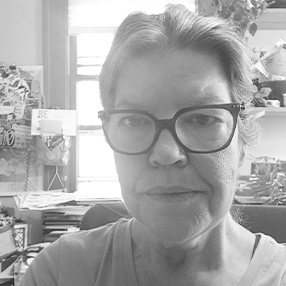the blackberries mold again before they’re half-eaten
everyone needs toilet paper and diapers
dirt cheap
new washing machines are hard to come by
we/she/they have no words
assisted living
dragged through the dirt
my mother struggles toward the bathroom
on camera behind her walker, soils herself
don’t talk dirty
she can’t help it, but she’s still ashamed
eat dirt
I wiped her bottom in January
& said I’d be back in March
I am no fortune teller
hit the dirt
she grew up in dust storms,
stuffing rags under doors hurry-scurry,
dirt-poor, and that’s shameful too
don’t air your dirty laundry in
public
she wants to eat chocolate all day
she wants to send hose to her grandmother
dirtbag
she wants to know why we stole her baby
she wants to know when the kids are coming
she wants to know where my father is
treated like dirt
she wants to know the time/the day/the month/the year
my family doesn’t know how to communicate
dig up dirt
when my mother said dirty she meant
Copyright © 2021 by Wendy Vardaman. Originally published in Poem-a-Day on November 15, 2021, by the Academy of American Poets.
“Just before the pandemic, my brother and I moved our mother to assisted living. She is confused and ashamed and scared and lonely. She says she is ‘useless.’ That’s how I feel, too, mismanaging her care from a distance. I try to practice compassion—for myself, for her, my brother, the caregivers. Language gets in the way. So does personality, family history and trauma, culture, economics, judgment. I want her to feel loved and lovable. At the end of The Plague, Dr. Rieux resolves to tell others ‘what we learn in time of pestilence: that there are more things to admire in men than to despise.’”
—Wendy Vardaman

